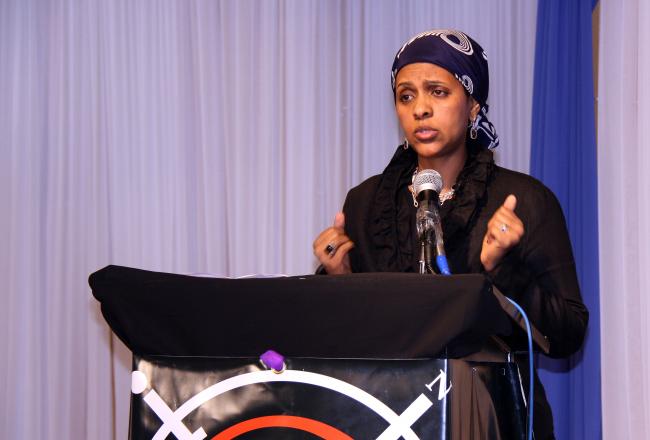 | When couples struggle with infertility, the social pressure can be intense.
In Somali culture, an age-old tradition holds that a woman must have children to fulfill her role as a wife.
Fartun Weli is challenging those notions by talking about them publicly, earning attention in Minnesota and back home in Somalia.
Weli, 40, provides a welcome ear for women who have trouble becoming pregnant ands feel isolated because of the stigma associated with infertility in the Somali community.
On a recent a home visit, she spoke to a Somali woman who, after having one child, hasn't been able to get pregnant again. The woman, whom MPR News has agreed not to identify, was anxious to talk openly about the subject with another Somali woman.
"I checked out myself," the woman said. "They said this, you know, 'you have bacteria.' But it's like it's deeper than that. We don't know. We're in different country." |
Even in the United States, the woman must deal with traditional expectations. She tells Weli that other Somalis have asked her if she was taking birth control. People who aren't even relatives ask if she's sleeping with her husband. They imply she cares more about her career than family.
"I wish they could back off," the woman said.
Weli knows exactly what the woman's going through. She came to Minnesota from Somalia 11 years ago and married a few years later. She and her husband Jamal tried to have children but couldn't.
After several failed attempts, Weli started seeing doctors. One told her she had premature ovarian failure, and would never have children.
Weli said she could not have made it through such as difficult time time without her husband.
"He kept me alive," she said. "I would say he was my life support. Every time I got my period I was like sobbing and crying."
But Weli couldn't fall apart. Her family in Somalia was depending on her to stay productive so she could send money home.
"So I started focusing my education, and work, and read a lot of books about depression, about self help things," she said. "And then, women started approaching me, like Somali women, approaching me and talking to me about their issues."
Weli was accessible because she worked as translator at the Park Nicollet Methodist Hospital in St. Louis Park. Its chair of gynecology, Dr. Deb Thorp, has been treating Somali women with fertility issues for years.
"Most of them come in thinking that it's their problem --because they're the ones that aren't getting pregnant, they're the ones that have to fix it," Thorp said. "So they come in asking for pills to get pregnant even though they've been married like two months, three months, four months. Because they're terrified they won't be able to reproduce."
"A third of infertilty is female based, a third is male based, a third is couple based, meaning there's potential issues with both the male and the female and, or, the interaction," she said. "But in Somali culture it's very difficult to get men to get any testing and most of them won't."
Thorp helped Weli obtain a $2,000 grant from the Park Nicollet Foundation to fund a support group and outreach efforts.
"There was no such thing as support group in my community so I said well, I'll be the first."
Weli held the first meeting on a Saturday in November. Despite a snowstorm, more than 100 people came to hear her speak. The event aired on Somali TV. Weli was interviewed on the Voice of America and BBC Somali language channel. Imams expressed support for her work.
Now Weli receives many emails a day from Somalis asking for help on fertility issues. Somalis from across the United States, Europe, the Middle East, and Somalia call her.
The response has been overwhelmingly positive. But Martin Mohamed, an organizer who's been helping Weli with the program, said there will probably be some backlash.
"I think the rejection is going to be there," he said. "I think there's going to be a time where she'll be blamed for changing the community, you know becoming more westernized, things like that. but it's very important issue to expose, to talk about."
Criticism may arise, but Weli said she's focused on her goal. She's meeting one-on-one with women to encourage them to come to the support group where they can talk openly about their struggles with infertility.
Source: Minnesota Public Radio







 Similar topics (5)
Similar topics (5)